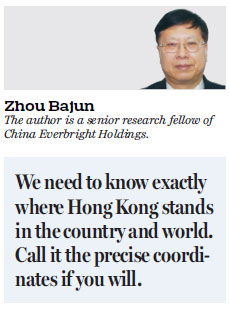Think tanks should provide sound coordinates for city's development
Updated: 2017-11-29 05:59
(HK Edition)
|
|||||||||
Some international or foreign institutions have released annual research reports in recent years comparing cities in various economies, including Hong Kong. For example, the Heritage Foundation of the United States publishes a free economy chart every year; while the World Economic Forum and International Institute for Management Development (IMD) publish their own competitiveness rankings. A few Chinese mainland research institutions also release similar rankings, such as the annual city competitiveness chart published by the Chinese Academy of Social Sciences (CASS) comparing Hong Kong with cities on the mainland, Taiwan and Macao.
Hong Kong society does not reject or oppose being compared with mainland cities by mainland-based research institutions but it does prefer being considered more of a global economic entity than anything else. As a result some people here insist Hong Kong should not be allowed to be like mainland cities.

The Hong Kong Special Administrative Region, while exercising "one country, two systems", should indeed maintain its uniqueness from mainland cities. Its uniqueness should be recognized, along with the fact that it is more comparable to some major cities in Western countries than to big mainland cities. However, none of the research institutes affiliated with universities or non-government think tanks in Hong Kong have done or are doing comparative studies of Hong Kong, mainland and foreign cities. As a result the SAR government and Hong Kong society in general can only rely on comparative studies by international, foreign and mainland research institutions for relevant information. Because different research institutions approach their comparative studies from different angles, the findings are not always solid enough for Hong Kong to determine its position in the world, the Asia-Pacific region or the country. It is time to change this situation for the better.
In Hong Kong the fifth-term SAR government has decided to adjust its passive role in economic development to an "appropriately proactive" one. Chief Executive Carrie Lam Cheng Yuet-ngor's first Policy Address includes all areas of economic, political and social development and shows her global vision. To make sense of the Policy Address we need to know exactly where Hong Kong stands in the country and world. Call it the precise coordinates if you will.
Firstly these coordinates should not be used to compare the present with Hong Kong's past only. Comparing Hong Kong with its own past can show if it has slowed down or progressed but that kind of progress may not show how well it is doing compared with other cities. For example, Hong Kong has no doubt improved in terms of gross domestic product and per capita GDP in recent years but not as much as Singapore has.
Secondly these coordinates should not completely separate the comparison between Hong Kong and foreign big cities from that between Hong Kong and big mainland cities.
The country has entered a new era of socialism with Chinese characteristics. As China moves closer to the center of the world stage and encourages other countries to join the pursuit of a shared future for mankind, mainland research institutions will take up comparative studies of big cities in the mainland, Hong Kong, Macao, Taiwan and foreign countries. Currently the Center for City and Competitiveness of the CASS only releases the annual China Urban Competitiveness Report, but it is expected to issue an annual Global Urban Competitiveness Report in the near future. Or another mainland-based research institution will do so.
Hong Kong's universities and non-government think tanks, on their part, should undertake systematic comparative studies of Hong Kong with mainland and foreign cities. Of course things unique to Hong Kong should be excluded from comparison but it is agreed the comparability between Hong Kong and mainland big cities will only grow in the future.
Determining Hong Kong's coordinates by comparing Hong Kong with mainland and foreign cities will help the SAR government see clearly how Hong Kong's development should proceed. It is a given that Hong Kong should aim for the leading position as one of the most advanced cities in the world. The question is what exactly makes a city more advanced than the rest? How can a city catch up with the best if it doesn't know in what areas it is behind? Only when seeing the standard and knowing how far it is behind will the SAR government know exactly what to do to catch up and Hong Kong society will see which target it is aiming at.
In order to decide on sound coordinates Hong Kong society needs to know precisely in what way Hong Kong should not be like the big cities on the mainland.
Should Hong Kong maintain its legal system, which is different from the mainland's? The answer is yes but not so absolute as to "have nothing to do with the mainland's legal system". The mainland's real-estate industry reform and property market borrowed a lot from Hong Kong's experience and so did the stock exchanges in Shanghai and Shenzhen, including relevant laws. The common-law and civil-law systems are apparently very different from each other but not completely without similarities or absolutely non-compatible. Hong Kong should be open-minded toward the need for the two legal systems to be mutually tolerant and even accepting.
Then there is the question whether Hong Kong should keep its prejudice against the country's political system, to which the answer should be no for sure. The progress and achievements the country has made over the years are recognized around the world. If Hong Kong society believes in true freedom of speech it should tell the real China story instead of bad-mouthing the country.
(HK Edition 11/29/2017 page7)